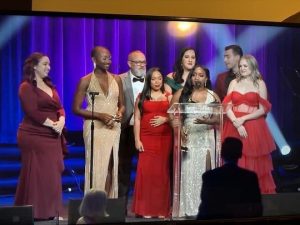SAN BERNARDINO, CA—On Tuesday, Oct. 17, the Board of Education presented the Outstanding Achievement Awards to students, parents and staff of Ramona-Alessandro and Lankershim Elementary Schools, Del Vallejo Leadership & STEAM Academy and Middle College High School (MCHS).
The Board recognizes Outstanding Student Award winners to honor excellence in academics, athletics, fine arts, citizenship, and most improvement. The Board also presents the Outstanding Parent/Grandparent/Volunteer Award and Outstanding Employee Award to individuals who embody the district’s dedication to student achievement and well-being.
Ramona-Alessandro Elementary School, Principal Teresa Hopkins:
Vivionna Hamilton is a fifth grader and Outstanding Student. Hamilton is a driven scholar who excels in whatever she sets her mind to. She does well academically, plays saxophone in the advanced band and plays on the after-school softball team. Hamilton also works well with others and is very helpful, even representing her classmates as a student council member. Hamilton aspires to become a nurse.
Jason Johnson is a sixth grader and Outstanding Student. Johnson has a good attitude, is in school every day and is helpful to others. He doesn’t give up easily and is quick to correct any mistakes. He currently plays on Alessandro’s soccer team and promotes leadership on the field. Johnson wants to play college basketball or football while studying architecture and engineering in college.
Outstanding Parent Award winner Cathlene Botello is dedicated to Ramona-Alessandro’s School Site Council, providing suggestions and feedback to improve the school. She is a member of Alessandro’s Tiger University, which empowers families to build healthy relationships and college and career readiness for scholars. Botello plays a pivotal role in the lives of her children and makes a positive difference in the lives of others.
Secretary Ashley Dorsey is an Outstanding Classified Employee. Dorsey has an unwavering commitment to Ramona-Alessandro and the community. She has a collaborative spirit and the ability to work with others. Her participation with the PBIS team and family nights and other events contributes to Alessandro’s positive culture and success. Dorsey inspires others through her positive attitude and strong work ethic.
Demonstration teacher Shannan Usher is an Outstanding Certificated Employee. Usher prioritizes the academic and personal growth of her scholars above all else. She holds the belief that every scholar can succeed and tailors the instruction to meet their diverse learning needs. Usher views each day as an opportunity to ignite scholar’s curiosity, inspire critical thinking, and foster a love of learning.
Lankershim Elementary School, Principal Evette Peters:
Veronnika Palmer is a fourth-grader and Outstanding Student. Palmer is very kind and helpful. She helps her classmates if she sees they are struggling. She is always on task, has a very positive attitude and tries to excel at all she does! Palmer plans to study Environmental Science in college to help protect plants because they are a valued food source, and she wants them to still be around.
Diego Ramirez is a sixth-grader and Outstanding Student. Ramirez’s enthusiasm for learning is not only obvious from his exceptional grades but also in the way he inspires his classmates to reach for new heights. His leadership in group projects and his willingness to help others in need have enriched the classroom environment. Ramirez wants to attend college and join a Major League Baseball team.
Outstanding Parent Award winner Samantha Liotta has been actively involved at Lankershim since her oldest child was in kindergarten, and he is now a high school senior. She has volunteered in numerous classes over the years, and she continues to help teachers long after her own children have moved on to other classes. School staff are proud to call her a Lankershim Lion.
Bilingual Attendance Assistant Susie Vazquez is an Outstanding Classified Employee. Vazquez goes beyond just marking attendance. Her commitment, skills, professionalism and genuine passion for her role have not only strengthened Lankershim’s attendance system, but also built invaluable connections with the diverse scholar and parent community.
Kindergarten Teacher Gail Shaw is an Outstanding Certificated Employee. Shaw has been a beacon of commitment and excellence in education for more than 30 years. Gail consistently goes the extra mile for her students and their parents, ensuring they receive the utmost support for academic achievement. She works tirelessly to ensure that she is aligned to site and District goals and focuses on results together as she leads her kindergarten team.
Del Vallejo Leadership & STEAM Academy, Principal Jackie Maner:
Eighth-grader Tyree Hollins is an Outstanding Student. Hollins is a kind and extremely respectful young man. He always gives 110% to the task at hand. He is a role model on campus and is always the first scholar to volunteer to help others. Hollins doesn’t know which college he wants to attend, but he knows he wants to make friends and enjoy life.
Kimberly Nguyen is an eighth-grader and Outstanding Student. Nguyen’s drive to learn pushes those around her to reach higher in an effort to keep up. She is also compassionate, going out of her way to help her peers and staff. Nguyen’s favorite class is STEAM, and she credits her teacher Nicholas Destasio for helping her to express her creativity in a meaningful way. Her career goal is to become an animatronics designer.
Marisol Delgado is an Outstanding Parent Award winner. Delgado is a constant presence on the Del Vallejo campus. She is more than an advocate for her son. She is his champion. Whether it’s volunteering to attend field trips, participating on parent advisory councils or serving as a liaison between the District and school, Delgado is all in. She helps to make Del Vallejo a great place to learn and grow.
Outstanding Custodian I Marcelle Baber is an Outstanding Classified Employee. Baber has been essential in the maintenance of a safe and positive environment at Del Vallejo by way of the cleanliness of the campus and the pride and enthusiasm he takes in performing his daily tasks. His productivity and outcomes reflect his dedication to SBCUSD and the community at large. And as an employee and a human being impacting the lives of children, Baber is a testament to the true spirit of Basics of Excellence.
Elizabeth Thomas is an Outstanding Certificated Employee and Middle School Science Teacher. She approaches her work and customer service with positivity and optimism. Her approach to education is deeply rooted in doing what’s best for every person she encounters. And Thomas’s actions and work habits are guided by her sense of purpose, positive passion and emotional commitment to her students.
Middle College High School, Principal James Espinoza:
Senior Anthony A. Lopez is an Outstanding Student. Lopez works hard in all of his classes, both high school and college, and currently has a 4.82 G.P.A. As an exemplary Peer Leader, he goes out of his way to help his classmates and the MCHS staff. During a recent Peer Leader event, Lopez worked behind the scenes supporting others and problem-solving. Lopez plans to continue his college education at UCLA before serving others through a career in medicine.
Nishia McCain is a senior and an Outstanding Student. She started Middle College’s first Mock Trial team and scored perfect 10s as a defense or prosecution lead attorney in every match. As ASB president, she’s demonstrated her passionate, creative, risk-taking and totally collaborative leadership style that has inspired every grade level and club this year. McCain plans to become a civil rights attorney, where she will serve our community and close equity gaps.
Hardy Brown, Jr. is an Outstanding Parent. Brown is an amazing advocate for MCHS, promoting the dual enrollment site as a means for closing equity and college completion gaps. He’s influenced many students and their families in their decision to apply to and attend MCHS, not just his own children, Peyton, a current 10th-grade student, and Jordan, a 2016 alumnus. And Hardy Brown, Jr.’s speech at the school’s 10-year anniversary was truly inspiring.
Custodian I Silvia Hernandez is an Outstanding Classified Employee. Hernandez demonstrates love for the MCHS Wolverine family by working tirelessly to make sure the site is clean and ready to provide a welcoming and accommodating place for students and visitors. Hernandez goes above and beyond in all she does, including picking up all trash on the perimeter of the school each morning before the school day starts.
Math Teacher, Dept. Chair, Math/Tech Coach Axel Olson is an Outstanding Certificated Employee. Olson is known for his positive passion and has a sense of purpose, seeking to close student equity gaps and meet Middle College goals. During distance learning, he served by helping the entire MCHS staff become experts in Google Classroom.
 Westside Story Newspaper – Online The News of The Empire – Sharing the Quest for Excellence
Westside Story Newspaper – Online The News of The Empire – Sharing the Quest for Excellence


